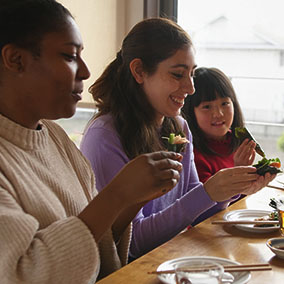In 2005 my family and I moved to a university town in the mid-south. Having lived in urban settings my whole life, this was a culture shock for me in some ways. The diversity of cultures I was used to seeing was not as evident. However, I learned about a program at the university that matched families with international students, and quickly signed up.
Over the next several years, my family invited international students from all over the world into our home to share meals, birthdays, and holidays. They came from many countries and different religious worldviews. We took them on family outings like fishing and canoeing, to restaurants, or just to the store so they could buy things they needed.
A few things motivated my wife and I to do this. One was the compelling argument that the majority of international students who study in the US will never step foot in an American home during their years of study. We wanted to both demonstrate and share the love of Christ with them. As parents, we also had in mind the blessing this would bring to our children–to meet people from other cultures, hear their stories, get to know of their experiences, and invite them to participate in our family as much as they were willing.
One particular student, a nominal Muslim, was studying for his PhD in bio genetics. He seemed to enjoy taking part in our family events and our kids grew closer to him than many of the others. When he finally finished his studies and graduated, we were his only “family” present to celebrate with him. We took him to a restaurant after his graduation ceremony to celebrate his wonderful achievement.
Over the years, these ongoing experiences seemed to work in the lives of our three kids, giving them a greater appreciation of people from other cultures, helping them avoid the many prejudices that even the media can foster, enabling them to feel comfortable speaking to people of other faiths and beliefs, and teaching them not to fear what may seem strange or different. In fact, each of our kids took a “gap year” in another country before beginning their university studies. One went to live and work in India, and the other two went to work and study in Costa Rica.
What if you do not live near a university with a program that makes it easy to connect with people from other cultures? Here are creative ways your family can accomplish the same thing:
- When your family encounters someone from another culture (for example, in line at a store), initiate a conversation in which you ask about where they are from, their family, and their experience in your country. If your kids observe how easy it can be to initiate a conversation with someone from another culture, they will learn to do this as well.
- Rotate where your family goes to eat, giving your kids a choice of three different international restaurants. Beforehand, have your kids study some basic things about the country represented. Be looking for how the Lord may open up an opportunity to get to know someone at the restaurant, whether it be the workers or other patrons.
- Have your kids invite a classmate from another culture to your home for lunch. Get to know his/her parents and invite the whole family for a meal in your home.
About the Author: Dave and his wife Eli live and work from Lima, Peru, where he is the CMM Regional Team Leader for Latin America. He has been involved in mobilization for over 20 years. The Flynns have three grown children and two grandchildren





